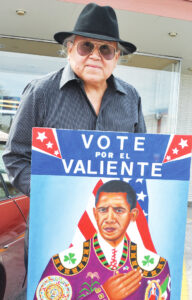 BY AYANNA ALEXANDER and GARY FIELDS, Associated Press
BY AYANNA ALEXANDER and GARY FIELDS, Associated Press
WASHINGTON, DC, Dec. 30, 2023 (AP): Activists say they are looking for messages that will resonate with voters, despite fighting through their own fatigue. Recent polling shows that adults in the United States are broadly unenthusiastic about a rematch between Biden and former President Donald Trump at the top of the ticket.
Voting advocacy groups that were essential to Biden’s victory in 2020 are coming into the new year expecting to have a difficult time rebuilding the same level of support, especially among voters of color and younger voters.
Just 33% of nonwhite adults under age 45 approve of Biden’s job performance, according to the most recent Associated Press-NORC Center for Public Affairs research poll. Just as concerning for the Biden camp is the precipitous drop he has seen overall among Black and Latino adults from his first months in office, when his approval rating was 86% among Black adults, 63% among Latino adults and 49% among white adults. Now those approval rate stand at 50%, 36% and 40%, respectively.
Democratic campaign strategists say they are encouraging more robust outreach to such voters in key states. Voting activists said they know voters of color are essential for Biden and cited myriad reasons for the drop-in support. Among them is the failure to pass a law that would have strengthened voting rights, after numerous Republican- controlled states passed restrictions in the past few years, and Biden`s promise about student loan forgiveness, only to see the Supreme Court kill it.
The Rev. Frederick Haynes, president of the Rainbow PUSH Coalition, the Chicago– based civil rights group founded more than 50 years ago by the Rev. Jesse Jackson, said the Democratic Party needs to tell voters what it has accomplished and what it plans to do beyond next year`s election.
“Rainbow PUSH will be challenging the administration: What are you doing to get the message through the appropriate mediums to the communities that you say you’re serving?” Haynes said.
The Biden campaign agrees and said it is highlighting gains that include delivering on broadband internet access, especially in communities of color, reducing unemployment rates and diversifying the federal judiciary, said Quentin Fulks, the principal deputy campaign manager.
Fulks added that the campaign also has begun organizing programs in two crucial states, Arizona and Wisconsin, to communicate with Latino, Black and young voters.
The Trump campaign did not respond to multiple requests for comment.
The Georgia Black Republican Council is planning a radio and billboard campaign highlighting issues it thinks are pertinent to Black voters in a state expected to be closely contested. Among the topics are school choice, immigration and abortion. The organization has plans to conduct listening sessions at Black churches across the state.
Other voting advocates say their messages to communities of color will range from successes, such as continued low unemployment, to explanations about why priorities such as federal voting and police overhaul legislation failed. Statewide issues will be a critical part of their messaging, highlighting book bans, gerrymandered districts and abortion.
Activists also plan to highlight some of the direct attacks on their efforts and priorities. Since 2021, for example, about 10 states have attempted to create or increase criminal penalties and fines for individuals and groups that assist voters. Several of those laws faced legal challenges.
Recently, a panel of three federal appeals court judges ruled that private individuals and groups do not have the ability to sue under a key section of the Voting Rights Act. It’s another example of an attack on the tools that remain to protect voters, said César Ruiz, an associate counsel with a focus on voting rights for LatinoJustice.
Yterenickia Bell, senior director of the And Still I Vote Program at the Leadership Conference Education Fund, will be targeting women of color between age 18 and 35 in 11 states, including Arizona, Georgia, Michigan, Nevada, North Carolina, Pennsylvania and Wisconsin.
“We have to remind them when we go to that door that the country is only as successful as the young people who are engaged,” she said, pointing out that many of the front-line civil rights activists of the 1960s were their age at the time.
Student debt, climate change, health care, abortion and reproductive care will be the selling points to that targeted group, Bell said.
Mishara Davis, director of issue and electoral organizing at State Voices, said the message cannot be one size fits all.
“The same messaging that we use for young Black students in Georgia may look a little different than when we’re speaking to white women in Wyoming,” Davis said. “Or we’re speaking to a church congregation in Arkansas compared to someone in Detroit.”
That method was proved in Ohio last fall when voters approved a constitutional amendment that guaranteed the right to abortion, said Prentiss Haney, co- executive director of the Ohio Organizing Collaborative. He said the group registered at least 20,000 people, 90% of whom were Black voters, and knocked on more than 200,000 doors, making their outreach the largest Black voter engagement program in the state.
The key was not treating the Black community as if it was monolithic, he said. The group is aiming to take a similar approach in 2024, when Ohio will have one of the most closely watched Senate races in the country.
“What we did is understand that there’s diversity in values and ideology, especially in Black voters anywhere in the country, and especially in Ohio,” Haney said.
In short, the questions should be about who supports health care, higher wages, voting rights and bodily autonomy, he said.
AP Director of Public Opinion Research Emily Swanson and Rico de La Prensa contributed to this report. Copyright 2023 The Associated Press.

